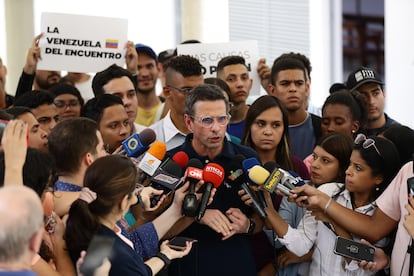Tensions emerge within Venezuelan opposition as deadline approaches to find a candidate to face Maduro
There are doubts about the participation of the National Electoral Council — a Chavista-controlled institution — in the organization of primary elections. Many fear the that it won’t be possible to present a candidate of consensus

The Unitary Platform — an alliance made up of Venezuela’s opposition parties — is struggling to agree on the mechanisms that will allow it to organize primary elections to choose a candidate of consensus for the 2024 presidential elections.
While all members of the democratic opposition are aware that political unity is critical, certain disagreements are long-standing. The result of these tensions could be a series of defections, which could weaken the alliance’s strategy of presenting a single candidate to face off against President Nicolás Maduro, who has ruled Venezuela since 2013. Maduro succeeded Hugo Chávez, who governed the oil-rich country from 1999 until 2013 with his United Socialist Party, before dying of cancer.
If more than one candidate runs against Maduro from the Venezuela opposition, the resulting vote-splitting could be catastrophic. On top of this fear, the Unitary Platform’s leadership is debating whether to organize the primaries with or without the assistance of the National Electoral Council (CNE) — an institution which is controlled by the ruling Chavista government. After so many controversial elections, an important segment of the opposition has deep reservations about working with the authorities.
For the political parties that are hardline anti-Maduro — such as Vente Venezuela (“Come along, Venezuela”), which is led by high-profile former congresswoman María Corina Machado — accepting technical assistance from the CNE is a mistake. Machado has demanded a self-organized consultation with manual counting. Andrés Velásquez, of the Causa Radical (Radical Cause) party, has a similar perspective.
These factions insist that the CNE will do whatever is necessary to distort the results. They are particularly distrustful of the biometric mechanism of fingerprint scanners — present in the automated voting systems — which retain the identity of voters. Members of the opposition believe that this stored information can be used against citizens, especially since, as it’s not a general election, all participants don’t support Chavismo.
In the opposition ranks, the memory of a 2004 incident is very much alive. That year, the Venezuelan government stored the data of citizens who promoted a recall referendum to remove Hugo Chávez from power. These individuals were subsequently punished, dismissed from their jobs, or prevented from contracting with the state, in retaliation for being part of this constitutional initiative.
“If the [commission organizing the primaries] gives in to the CNE, they won’t just be excluding me, but everyone,” declared María Corina Machado, warning about the consequences that this announcement could bring. Some opposition politicians privately take it for granted that, in the event of this, Machado would continue her candidacy on her own.
“If the [opposition] ends up delivering information to the CNE, it will end up being painted on the wall. They’ll kill the election — that will seriously affect unity,” Velásquez noted.
The more moderate opposition parties — such as Acción Democrática (Democratic Action), Primero Justicia (Justice First) and Un Nuevo Tiempo (A New Era) — also have their doubts. They understand the points that Machado has made, but overall, they seem willing to agree with the CNE’s role in organizing the primaries. Former presidential candidate Henrique Capriles, who was defeated by Chávez and Maduro in 2012 and 2013 respectively, is the most prominent voice in favor of CNE’s participation.
It has often been argued that self-managed elections by the opposition would be twice as expensive — with the necessary resources currently unavailable — and more exposed to being sabotaged by the Chavista regime. This sabotage could occur in a variety of ways, from the government-controlled judiciary intervening to sort out disputes between candidates, or Chavista militants simply acting violently against the electoral process.
Given the panorama, an important opposition leader — who has preferred to remain anonymous — has affirmed that “there is no good decision” in this debate, since both options present enormous costs. “We’re obliged to take the [path] that achieves the greatest unity possible.” The group of parties that is inclined to agree with the CNE’s involvement will likely be in a position to impose its majority on the Unitary Platform.
The electoral schedule is drawing closer and closer, while logistical efforts are piling up. In order to find a candidate, the decision to organize the primaries with or without the CNE will have to be made very soon. It has already been postponed twice.
Sign up for our weekly newsletter to get more English-language news coverage from EL PAÍS USA Edition
Tu suscripción se está usando en otro dispositivo
¿Quieres añadir otro usuario a tu suscripción?
Si continúas leyendo en este dispositivo, no se podrá leer en el otro.
FlechaTu suscripción se está usando en otro dispositivo y solo puedes acceder a EL PAÍS desde un dispositivo a la vez.
Si quieres compartir tu cuenta, cambia tu suscripción a la modalidad Premium, así podrás añadir otro usuario. Cada uno accederá con su propia cuenta de email, lo que os permitirá personalizar vuestra experiencia en EL PAÍS.
¿Tienes una suscripción de empresa? Accede aquí para contratar más cuentas.
En el caso de no saber quién está usando tu cuenta, te recomendamos cambiar tu contraseña aquí.
Si decides continuar compartiendo tu cuenta, este mensaje se mostrará en tu dispositivo y en el de la otra persona que está usando tu cuenta de forma indefinida, afectando a tu experiencia de lectura. Puedes consultar aquí los términos y condiciones de la suscripción digital.








































